IP
-
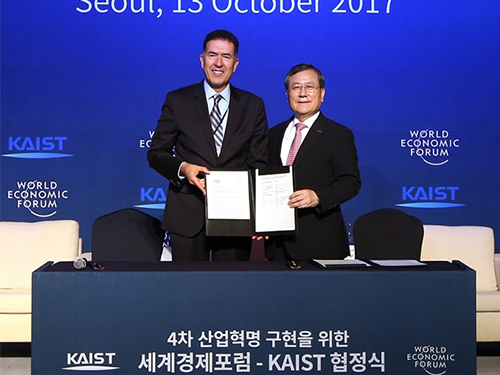 KAIST Partners with WEF to Prepare for the 4th Industrial Revolution
KAIST President Sung-Chul Shin and the Head of the World Economic Forum Center for the Fourth Industrial Revolution, Murat Sonmez, made a commitment to build cooperation in an active manner for addressing the ramifications of the Fourth Industrial Revolution.
The two signed an MOU to cooperate in research in related fields on October 13 after holding a roundtable discussion titled “The Future of Jobs and Inclusive Growth in Korea”. It is the first partnership that the WEF has sealed with an academic institution.The roundtable discussion brought together distinguished guests from politics, non-profit civic organizations, academia, and enterprises including Daejeon Mayor Seon-Taek Kwon, Doosan Group Vice Chairman Lee Hyun-Soon, and Korean Venture Business Association President Ahn Keon-Joon.
During the news conference, President Shin said, “This event means a lot because it explores ways in which inclusive growth and job creation can be realized in Korea. To move forward in the new age of the Fourth Industrial Revolution, every country needs to adopt appropriate new policies suitable for their specific market environments. KAIST will contribute to this process for Korea as well as for the global community.”
President Shin also said, “Korea has been a fast follower in previous industrial revolutions. Now, we have the momentum to seize the opportunities in the wake of this revolution. KAIST is dedicated to leading Korea into becoming a first mover in the Fourth Industrial Revolution by cooperating with the WEF.”
“Two decades later, we will live with considerable number of robots around us. It is possible that our societies in the future will consist of Homo sapiens and Robo sapiens. We need to create new jobs for Homo sapiens to prepare for a society that we will have to coexist with a new industrial tribe. Industries need continuing education to retrain workers for the ever evolving industrial landscape of the future,” President Shin emphasized.
Meanwhile, Sonmez pointed out that all stakeholders should participate in understanding the new industrial environment’s ramifications, saying “Societies, governments, public and private sectors, startups, and academia should co-design inclusive models through global efforts. Ethics and influences on the job market should also be taken into consideration.”
Sonmez said nine factors such as blockchains, internet of things, artificial intelligence, machine learning, cross-border data blow, drones, 3D printing, autonomous driving, the environment, and precision medicine will take center stage in the Fourth Industrial Revolution, In particular, he said that blockchains, which are a cybersecurity technology for online financial transactions, will bring even bigger changes than the ‘World Wide Web’ has done over the past three decades.
“To this end, we will have to work closely with major academic institutes. Through this partnership with KAIST, we will make the fruits of the new industrial environment benefit Koreans and Korean society,” Sonmez added.
2017.10.14 View 9068
KAIST Partners with WEF to Prepare for the 4th Industrial Revolution
KAIST President Sung-Chul Shin and the Head of the World Economic Forum Center for the Fourth Industrial Revolution, Murat Sonmez, made a commitment to build cooperation in an active manner for addressing the ramifications of the Fourth Industrial Revolution.
The two signed an MOU to cooperate in research in related fields on October 13 after holding a roundtable discussion titled “The Future of Jobs and Inclusive Growth in Korea”. It is the first partnership that the WEF has sealed with an academic institution.The roundtable discussion brought together distinguished guests from politics, non-profit civic organizations, academia, and enterprises including Daejeon Mayor Seon-Taek Kwon, Doosan Group Vice Chairman Lee Hyun-Soon, and Korean Venture Business Association President Ahn Keon-Joon.
During the news conference, President Shin said, “This event means a lot because it explores ways in which inclusive growth and job creation can be realized in Korea. To move forward in the new age of the Fourth Industrial Revolution, every country needs to adopt appropriate new policies suitable for their specific market environments. KAIST will contribute to this process for Korea as well as for the global community.”
President Shin also said, “Korea has been a fast follower in previous industrial revolutions. Now, we have the momentum to seize the opportunities in the wake of this revolution. KAIST is dedicated to leading Korea into becoming a first mover in the Fourth Industrial Revolution by cooperating with the WEF.”
“Two decades later, we will live with considerable number of robots around us. It is possible that our societies in the future will consist of Homo sapiens and Robo sapiens. We need to create new jobs for Homo sapiens to prepare for a society that we will have to coexist with a new industrial tribe. Industries need continuing education to retrain workers for the ever evolving industrial landscape of the future,” President Shin emphasized.
Meanwhile, Sonmez pointed out that all stakeholders should participate in understanding the new industrial environment’s ramifications, saying “Societies, governments, public and private sectors, startups, and academia should co-design inclusive models through global efforts. Ethics and influences on the job market should also be taken into consideration.”
Sonmez said nine factors such as blockchains, internet of things, artificial intelligence, machine learning, cross-border data blow, drones, 3D printing, autonomous driving, the environment, and precision medicine will take center stage in the Fourth Industrial Revolution, In particular, he said that blockchains, which are a cybersecurity technology for online financial transactions, will bring even bigger changes than the ‘World Wide Web’ has done over the past three decades.
“To this end, we will have to work closely with major academic institutes. Through this partnership with KAIST, we will make the fruits of the new industrial environment benefit Koreans and Korean society,” Sonmez added.
2017.10.14 View 9068 -
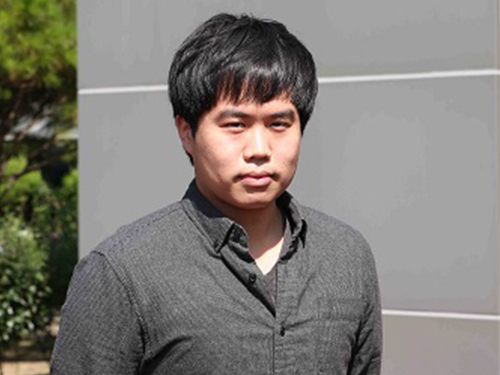 Sangeun Oh Recognized as a 2017 Google Fellow
Sangeun Oh, a Ph.D. candidate in the School of Computing was selected as a Google PhD Fellow in 2017. He is one of 47 awardees of the Google PhD Fellowship in the world.
The Google PhD Fellowship awards students showing outstanding performance in the field of computer science and related research. Since being established in 2009, the program has provided various benefits, including scholarships worth $10,000 USD and one-to-one research discussion with mentors from Google.
His research work on a mobile system that allows interactions among various kinds of smart devices was recognized in the field of mobile computing. He developed a mobile platform that allows smart devices to share diverse functions, including logins, payments, and sensors. This technology provides numerous user experiences that existing mobile platforms could not offer. Through cross-device functionality sharing, users can utilize multiple smart devices in a more convenient manner. The research was presented at The Annual International Conference on Mobile Systems, Applications, and Services (MobiSys) of the Association for Computing Machinery in July, 2017.
Oh said, “I would like to express my gratitude to my advisor, the professors in the School of Computing, and my lab colleagues. I will devote myself to carrying out more research in order to contribute to society.”
His advisor, Insik Shin, a professor in the School of Computing said, “Being recognized as a Google PhD Fellow is an honor to both the student as well as KAIST. I strongly anticipate and believe that Oh will make the next step by carrying out good quality research.”
2017.09.27 View 12515
Sangeun Oh Recognized as a 2017 Google Fellow
Sangeun Oh, a Ph.D. candidate in the School of Computing was selected as a Google PhD Fellow in 2017. He is one of 47 awardees of the Google PhD Fellowship in the world.
The Google PhD Fellowship awards students showing outstanding performance in the field of computer science and related research. Since being established in 2009, the program has provided various benefits, including scholarships worth $10,000 USD and one-to-one research discussion with mentors from Google.
His research work on a mobile system that allows interactions among various kinds of smart devices was recognized in the field of mobile computing. He developed a mobile platform that allows smart devices to share diverse functions, including logins, payments, and sensors. This technology provides numerous user experiences that existing mobile platforms could not offer. Through cross-device functionality sharing, users can utilize multiple smart devices in a more convenient manner. The research was presented at The Annual International Conference on Mobile Systems, Applications, and Services (MobiSys) of the Association for Computing Machinery in July, 2017.
Oh said, “I would like to express my gratitude to my advisor, the professors in the School of Computing, and my lab colleagues. I will devote myself to carrying out more research in order to contribute to society.”
His advisor, Insik Shin, a professor in the School of Computing said, “Being recognized as a Google PhD Fellow is an honor to both the student as well as KAIST. I strongly anticipate and believe that Oh will make the next step by carrying out good quality research.”
2017.09.27 View 12515 -
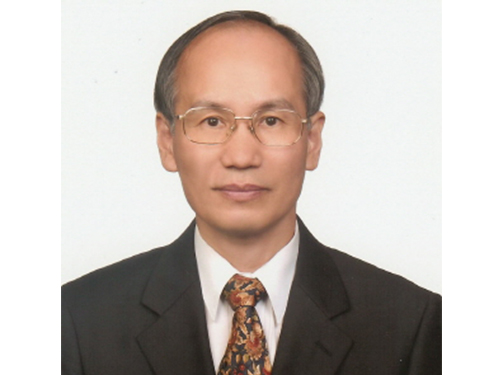 Professor Dan Keun Sung Endows Scholarship in Honor of His Retirement
Professor Dan Keun Sung in the School of Electrical Engineering contributed a 100 million KRW scholarship fund this month to KAIST to mark his retirement after more than three decades of work.
“As my retirement date comes closer, I have been thinking about what I could do for the school. I wanted to leave something behind, even though it’s small, for my lifelong school and students. I am hoping that this scholarship fund will benefit the members of KAIST.”
This isn’t his first time making a donation to KAIST. In 2013, Professor Sung donated ten million KRW, which was his cash prize from the 9th Haedong Academic Award of The Korean Institute of Communications and Information Sciences (KICS). At that time, Professor Sung had the chance to create a scholarship fund in his name; however, he wanted to highlight that the scholarship fund was for ‘someone,’ not created by ‘someone.’ In that sense, his scholarship fund was created with no name to benefit students in the School of Electrical Engineering. His colleagues and students supported his idea. Professor Seonghwan Cho, students, and alumni also participated in fund raising efforts, which reached 55 million KRW in total.
Professor Sung emphasized, “Donations should always be remembered, no matter how small they are.” He then explained his purpose for creating the scholarship fund by saying, “Fundraising can be truly meaningful to contributors, knowing that their money is going to supporting the school and students.”
Professor Sung, a fellow of the Institute of Electrical and Electronics Engineers (IEEE) Communication Society, started his post at KAIST in 1986. For the past 30 years, he has devoted himself to fostering young scholars and studying in the area of information and communication. He also participated in developing technologies for the resource management of various future cellular components, such as satellites, switchboards, and signaling networks.
2017.08.11 View 9635
Professor Dan Keun Sung Endows Scholarship in Honor of His Retirement
Professor Dan Keun Sung in the School of Electrical Engineering contributed a 100 million KRW scholarship fund this month to KAIST to mark his retirement after more than three decades of work.
“As my retirement date comes closer, I have been thinking about what I could do for the school. I wanted to leave something behind, even though it’s small, for my lifelong school and students. I am hoping that this scholarship fund will benefit the members of KAIST.”
This isn’t his first time making a donation to KAIST. In 2013, Professor Sung donated ten million KRW, which was his cash prize from the 9th Haedong Academic Award of The Korean Institute of Communications and Information Sciences (KICS). At that time, Professor Sung had the chance to create a scholarship fund in his name; however, he wanted to highlight that the scholarship fund was for ‘someone,’ not created by ‘someone.’ In that sense, his scholarship fund was created with no name to benefit students in the School of Electrical Engineering. His colleagues and students supported his idea. Professor Seonghwan Cho, students, and alumni also participated in fund raising efforts, which reached 55 million KRW in total.
Professor Sung emphasized, “Donations should always be remembered, no matter how small they are.” He then explained his purpose for creating the scholarship fund by saying, “Fundraising can be truly meaningful to contributors, knowing that their money is going to supporting the school and students.”
Professor Sung, a fellow of the Institute of Electrical and Electronics Engineers (IEEE) Communication Society, started his post at KAIST in 1986. For the past 30 years, he has devoted himself to fostering young scholars and studying in the area of information and communication. He also participated in developing technologies for the resource management of various future cellular components, such as satellites, switchboards, and signaling networks.
2017.08.11 View 9635 -
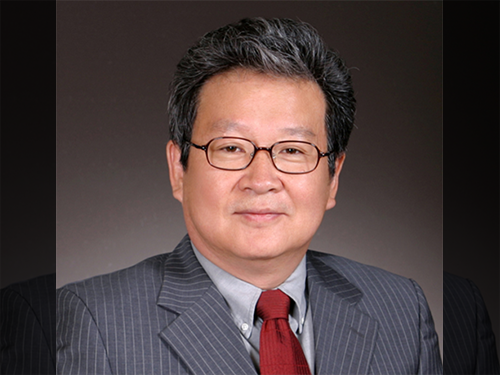 Professor Poong Hyun Seong Selected as Fellow of the ANS
Professor Poong Hyun Seong of the Department of Nuclear and Quantum Engineering was selected as a fellow of the American Nuclear Society.
The selection was announced at their annual meeting held in San Francisco on June 12, in recognition of Professor Seong's contributions to the field of nuclear instrumentation, control andhuman factors engineering.
Founded in 1954, the American Nuclear Society selects scholars who have made outstanding achievements and contributions to the development of the nuclear engineering field each year.
Professor Seong's researches in the field of nuclear instrumentation, control and human factors engineering have contributed to the safe operation of nuclear power plants, to the development of systems to maintain nuclear power plants safely in the event of emergency and to the enhancement of effective response capabilities of nuclear power plant operators. His researches significantly contributed to the safety improvement of nuclear power plants and have been recognized worldwide.
Professor Seong said, "Korea has emerged as a nuclear powerhouse. I think not only my academic career but our national reputation in the field of nuclear research has been well recognized by our global peers.” Professor Seong has served as president of the Korean Nuclear Society, editor in chief of Nuclear Engineering and Technology, and as a commissioner of the Korean Nuclear Safety Commission. He is currently working as a commissioner of the Korean Atomic Energy Commission.
2017.06.29 View 8117
Professor Poong Hyun Seong Selected as Fellow of the ANS
Professor Poong Hyun Seong of the Department of Nuclear and Quantum Engineering was selected as a fellow of the American Nuclear Society.
The selection was announced at their annual meeting held in San Francisco on June 12, in recognition of Professor Seong's contributions to the field of nuclear instrumentation, control andhuman factors engineering.
Founded in 1954, the American Nuclear Society selects scholars who have made outstanding achievements and contributions to the development of the nuclear engineering field each year.
Professor Seong's researches in the field of nuclear instrumentation, control and human factors engineering have contributed to the safe operation of nuclear power plants, to the development of systems to maintain nuclear power plants safely in the event of emergency and to the enhancement of effective response capabilities of nuclear power plant operators. His researches significantly contributed to the safety improvement of nuclear power plants and have been recognized worldwide.
Professor Seong said, "Korea has emerged as a nuclear powerhouse. I think not only my academic career but our national reputation in the field of nuclear research has been well recognized by our global peers.” Professor Seong has served as president of the Korean Nuclear Society, editor in chief of Nuclear Engineering and Technology, and as a commissioner of the Korean Nuclear Safety Commission. He is currently working as a commissioner of the Korean Atomic Energy Commission.
2017.06.29 View 8117 -
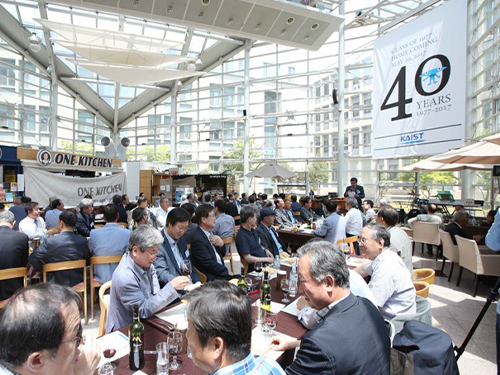 KAIST Class of '77 Celebrates 40-Year Reunion
The class of 1977 reunited on April 20 at the College of Business in Seoul campus, which was once the main campus when they were students 40 years ago. Now leaders of Korea in the sectors of industry, academia, and research, the class of ‘77 held a homecoming event in celebration of the 40th anniversary of their graduation.
The class of ’77 includes KAIST President Sung-Chul Shin and the Minister of Science, ICT and Future Planning Yanghee Choi. More than 100 graduates and 20 professors gathered at the homecoming event. Many of them were former ministers of science and technology, presidents of universities, heads of research institutes, and top managers from leading corporations such as Samsung Electronics and SK Telecom in Korea.
At the event, Professor Dong-Hoon Choi at Hangyang University, representing alumni Yoon-Mo Koo, Oh-Hyun Kwon, Dae-Young Kim, Yoo-Hyun Moon, Nam-Ho Paik, Ki Hwang Baek, Sung-Chul Shin, Mann-Ho Lee, and Sang-Bum Lee, donated a scholarship of 100 million KRW. Professor Choi said that, “This may not be a large sum of money, but we raised it with grateful hearts for the country and for KAIST. I hope this scholarship will become a small seed to raise bigger fruit.”
President Shin reminisced that, “The achievements made at KAIST during the last half century were only possible due to the dreams, visions, and innovative ideas of those who established KAIST, and the passion for research, education, and learning of our former professors and students.”
President Shin continued, “KAIST was the light of hope in the early industrialization period in Korea half a century ago, and as alumnus president I will devote body and soul for KAIST to be the light of hope in the early stages of the Industry 4.0, and thus continue to be the light of hope for the future of Korea.”
Notable guests presented include Former Minister of Science and Technology and former Provost of KAIST Kun-Mo Chung, Former Minister of Communications and former Professor Soon-Hoon Bae, Vice Chairman and CEO for Samsung Electronics Oh-Hyun Kwon, SK Telecom ICT President for Technology Ho-Soo Lee; President of Yeungnam University Gil Soo Sur; former President of the University of Seoul Sang-Bum Lee; President of the Korea Research Institute of Chemical Technology Kew-Ho Lee; and former President of the Korea Research Institute of Bioscience and Biotechnology Sang-Ki Rhee.
2017.05.23 View 6767
KAIST Class of '77 Celebrates 40-Year Reunion
The class of 1977 reunited on April 20 at the College of Business in Seoul campus, which was once the main campus when they were students 40 years ago. Now leaders of Korea in the sectors of industry, academia, and research, the class of ‘77 held a homecoming event in celebration of the 40th anniversary of their graduation.
The class of ’77 includes KAIST President Sung-Chul Shin and the Minister of Science, ICT and Future Planning Yanghee Choi. More than 100 graduates and 20 professors gathered at the homecoming event. Many of them were former ministers of science and technology, presidents of universities, heads of research institutes, and top managers from leading corporations such as Samsung Electronics and SK Telecom in Korea.
At the event, Professor Dong-Hoon Choi at Hangyang University, representing alumni Yoon-Mo Koo, Oh-Hyun Kwon, Dae-Young Kim, Yoo-Hyun Moon, Nam-Ho Paik, Ki Hwang Baek, Sung-Chul Shin, Mann-Ho Lee, and Sang-Bum Lee, donated a scholarship of 100 million KRW. Professor Choi said that, “This may not be a large sum of money, but we raised it with grateful hearts for the country and for KAIST. I hope this scholarship will become a small seed to raise bigger fruit.”
President Shin reminisced that, “The achievements made at KAIST during the last half century were only possible due to the dreams, visions, and innovative ideas of those who established KAIST, and the passion for research, education, and learning of our former professors and students.”
President Shin continued, “KAIST was the light of hope in the early industrialization period in Korea half a century ago, and as alumnus president I will devote body and soul for KAIST to be the light of hope in the early stages of the Industry 4.0, and thus continue to be the light of hope for the future of Korea.”
Notable guests presented include Former Minister of Science and Technology and former Provost of KAIST Kun-Mo Chung, Former Minister of Communications and former Professor Soon-Hoon Bae, Vice Chairman and CEO for Samsung Electronics Oh-Hyun Kwon, SK Telecom ICT President for Technology Ho-Soo Lee; President of Yeungnam University Gil Soo Sur; former President of the University of Seoul Sang-Bum Lee; President of the Korea Research Institute of Chemical Technology Kew-Ho Lee; and former President of the Korea Research Institute of Bioscience and Biotechnology Sang-Ki Rhee.
2017.05.23 View 6767 -
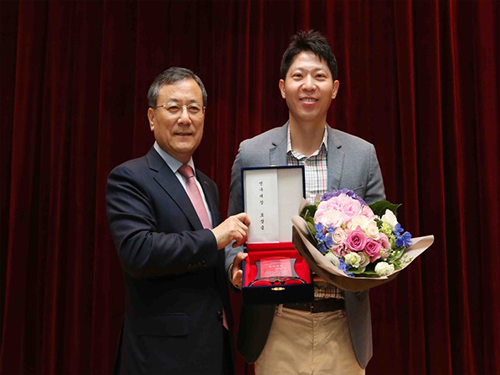 2017 KAIST Research Day Honors Professor Hoon Sohn
The 2017 KAIST Research Day recognized Professor Hoon Sohn of the Department of Civil and Environmental Engineering as Research Grand Prize Awardee in addition to the 10 most distinguished research achievements of the past year.
The Research Grand Prize recognizes the professor whose comprehensive research performance evaluation indicator is the highest over the past five years. The indicator combines the factors of the number of research contracts, IPR, royalty income, as well as research overhead cost inclusion.
During the ceremony, which was held on May 23, Professor Jun-Ho Oh of the Department of Mechanical Engineering and Professor Sang Yup Lee of the Department of Chemical and Biomolecular Engineering also won the Best Research Award. The two professors had the best scores when evaluating their research performance for one-year periods.
Meanwhile, the Research Innovation Award went to Professor YongKeun Park of the Department of Physics. The Research Innovation Award scores the factors of foreign patent registration, contracts of technological transfer and income from technology fees, technology consultations, and startups and selected Professor Park as the top winner.
Professors Yong Hee Lee of the Department of Physics and Jonghwa Shin of the Department of Material Science won the Convergence Research Award. The Convergence Research Award recognizes the most outstanding research team who created innovative research results for a year.
After the ceremony, President Chen Shiyi of the Southern University of Science and Technology gave a distinguished lecture on the “Global & Entrepreneurial Universities for the Age of the Fourth Industrial Revolution.” the Research Day ceremony, KAIST also presented the ten most distinguished research achievements made by KAIST professors during the last year as follows (Click):
▲ Commercialization of 3D Holographic Microscopy by Professor YongKeun Park of the Department of Physics
▲ Designer Proteins with Chemical Modifications by Professor Hee-Sung Park of the Department of Chemistry
▲ Lanthanum-Catalyzed Synthesis of Microporous 3D Graphene-Like Carbons in a Zeolite Template by Professor Ryong Ryoo of the Department of Chemistry
▲ Complete Prevention of Blood Loss by Self-Sealing Hemostatic Needles by Professor Haeshin Lee of the Department of Chemistry
▲ An Immunological Mechanism for the Contribution of Commensal Microbiota Against Herpes Simplex Virus Infection in Genital Mucosa by Heung Kyu Lee of the Graduate School of Medical Science and Engineering
▲ Development of a Pulse-Echo Laser Ultrasonic Propagation Imaging System by Professor Jung-Ryul Lee of the Department of Aerospace Engineering
▲ Bi-refractive Stereo Imaging for Single-Shot Depth Acquisition by Professor Min H. Kim of the School of Computing
▲ Development of Environment Friendly Geotechnical Construction Material Using Biopolymer by Professor Gye-Chun Cho of the Department of Civil and Environmental Engineering
▲ Protein Delivery Via Engineered Exosomes by Professor Chulhee Choi of the Department of Bio and Brain Engineering
▲ Hot Electron Detection Under Catalytic Reactions by Professor Jeong Young Park of the Graduate School of EEWS.
After the ceremony, President Chen Shiyi of the Southern University of Science and Technology gave a distinguished lecture on the “Global & Entrepreneurial Universities for the Age of the Fourth Industrial Revolution.”
(Photo:President Shin poses with the 2017 KAIST Research Grand Prize Winner Professor Hoon Sohn on May 23.)
2017.05.23 View 14158
2017 KAIST Research Day Honors Professor Hoon Sohn
The 2017 KAIST Research Day recognized Professor Hoon Sohn of the Department of Civil and Environmental Engineering as Research Grand Prize Awardee in addition to the 10 most distinguished research achievements of the past year.
The Research Grand Prize recognizes the professor whose comprehensive research performance evaluation indicator is the highest over the past five years. The indicator combines the factors of the number of research contracts, IPR, royalty income, as well as research overhead cost inclusion.
During the ceremony, which was held on May 23, Professor Jun-Ho Oh of the Department of Mechanical Engineering and Professor Sang Yup Lee of the Department of Chemical and Biomolecular Engineering also won the Best Research Award. The two professors had the best scores when evaluating their research performance for one-year periods.
Meanwhile, the Research Innovation Award went to Professor YongKeun Park of the Department of Physics. The Research Innovation Award scores the factors of foreign patent registration, contracts of technological transfer and income from technology fees, technology consultations, and startups and selected Professor Park as the top winner.
Professors Yong Hee Lee of the Department of Physics and Jonghwa Shin of the Department of Material Science won the Convergence Research Award. The Convergence Research Award recognizes the most outstanding research team who created innovative research results for a year.
After the ceremony, President Chen Shiyi of the Southern University of Science and Technology gave a distinguished lecture on the “Global & Entrepreneurial Universities for the Age of the Fourth Industrial Revolution.” the Research Day ceremony, KAIST also presented the ten most distinguished research achievements made by KAIST professors during the last year as follows (Click):
▲ Commercialization of 3D Holographic Microscopy by Professor YongKeun Park of the Department of Physics
▲ Designer Proteins with Chemical Modifications by Professor Hee-Sung Park of the Department of Chemistry
▲ Lanthanum-Catalyzed Synthesis of Microporous 3D Graphene-Like Carbons in a Zeolite Template by Professor Ryong Ryoo of the Department of Chemistry
▲ Complete Prevention of Blood Loss by Self-Sealing Hemostatic Needles by Professor Haeshin Lee of the Department of Chemistry
▲ An Immunological Mechanism for the Contribution of Commensal Microbiota Against Herpes Simplex Virus Infection in Genital Mucosa by Heung Kyu Lee of the Graduate School of Medical Science and Engineering
▲ Development of a Pulse-Echo Laser Ultrasonic Propagation Imaging System by Professor Jung-Ryul Lee of the Department of Aerospace Engineering
▲ Bi-refractive Stereo Imaging for Single-Shot Depth Acquisition by Professor Min H. Kim of the School of Computing
▲ Development of Environment Friendly Geotechnical Construction Material Using Biopolymer by Professor Gye-Chun Cho of the Department of Civil and Environmental Engineering
▲ Protein Delivery Via Engineered Exosomes by Professor Chulhee Choi of the Department of Bio and Brain Engineering
▲ Hot Electron Detection Under Catalytic Reactions by Professor Jeong Young Park of the Graduate School of EEWS.
After the ceremony, President Chen Shiyi of the Southern University of Science and Technology gave a distinguished lecture on the “Global & Entrepreneurial Universities for the Age of the Fourth Industrial Revolution.”
(Photo:President Shin poses with the 2017 KAIST Research Grand Prize Winner Professor Hoon Sohn on May 23.)
2017.05.23 View 14158 -
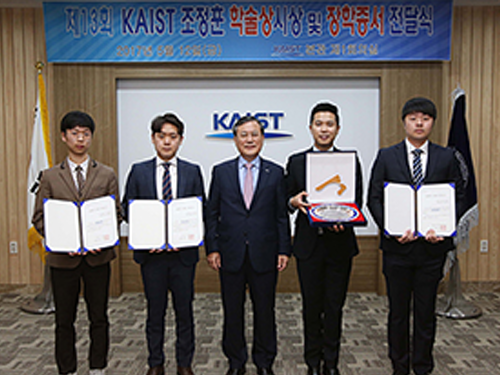 Dr. Zi Jing Wong Named 2017 Jeong Hun Cho Awardee
(Photo caption: The 2017 Jeong Hun Cho Scholarship recipients pose with President Shin (left photo) and Dr. Zi Jing Wong, the recipient of the 2017 Jeong Hun Cho Award)
Dr. Zi Jing Wong, a postdoctoral scholar at the University of California, Berkeley was named the 2017 recipient of the Jeong Hun Cho Award. The award recognizes outstanding young scientists in the field of aerospace engineering annually. The recipient receives a 20 million KRW prize.
The Award Committee said that Dr. Wong who earned his MS at KAIST Department of Aerospace Engineering is a rising scholar in the fields of optic meta materials, photonics, imaging, among others. He has published five papers on the realization of a zero refractive index and the control of a refractive index, as well as the realization of a 3D invisibility cloak in Science and Nature Photonics in 2014 and 2015. Dr. Wong also swept the best paper awards from many international academic societies including the US Materials Research Society, IEEE, SPIE, and Metamaterials Congress in 2015. He finished his Ph.D. at the University of California, Berkeley.
The Award Committee also named three recipients of the Jeong Hun Cho Scholarship: Ph.D. candidate Hyon-Tak Kim of the Department of Aerospace Engineering at KAIST, Ph.D. candidate Ho-Song Park from the Department of Mechanical Engineering at Korea University, and Hyong-Jin Choi of Kongju National University High School.
The award was endowed by the family of the late Ph.D. candidate Jeong Hun Cho who died in a rocket lab accident in the Department of Aerospace Engineering in 2003. Cho was posthumously conferred an honorary doctorate degree.
In memory of Cho, his father established the ‘Jeong Hun Cho Award and Scholarship.’ The scholarship annually selects three young scholars from Cho’s alma maters of KAIST, Korea University, and Kongju National University High School.
2017.05.12 View 11825
Dr. Zi Jing Wong Named 2017 Jeong Hun Cho Awardee
(Photo caption: The 2017 Jeong Hun Cho Scholarship recipients pose with President Shin (left photo) and Dr. Zi Jing Wong, the recipient of the 2017 Jeong Hun Cho Award)
Dr. Zi Jing Wong, a postdoctoral scholar at the University of California, Berkeley was named the 2017 recipient of the Jeong Hun Cho Award. The award recognizes outstanding young scientists in the field of aerospace engineering annually. The recipient receives a 20 million KRW prize.
The Award Committee said that Dr. Wong who earned his MS at KAIST Department of Aerospace Engineering is a rising scholar in the fields of optic meta materials, photonics, imaging, among others. He has published five papers on the realization of a zero refractive index and the control of a refractive index, as well as the realization of a 3D invisibility cloak in Science and Nature Photonics in 2014 and 2015. Dr. Wong also swept the best paper awards from many international academic societies including the US Materials Research Society, IEEE, SPIE, and Metamaterials Congress in 2015. He finished his Ph.D. at the University of California, Berkeley.
The Award Committee also named three recipients of the Jeong Hun Cho Scholarship: Ph.D. candidate Hyon-Tak Kim of the Department of Aerospace Engineering at KAIST, Ph.D. candidate Ho-Song Park from the Department of Mechanical Engineering at Korea University, and Hyong-Jin Choi of Kongju National University High School.
The award was endowed by the family of the late Ph.D. candidate Jeong Hun Cho who died in a rocket lab accident in the Department of Aerospace Engineering in 2003. Cho was posthumously conferred an honorary doctorate degree.
In memory of Cho, his father established the ‘Jeong Hun Cho Award and Scholarship.’ The scholarship annually selects three young scholars from Cho’s alma maters of KAIST, Korea University, and Kongju National University High School.
2017.05.12 View 11825 -
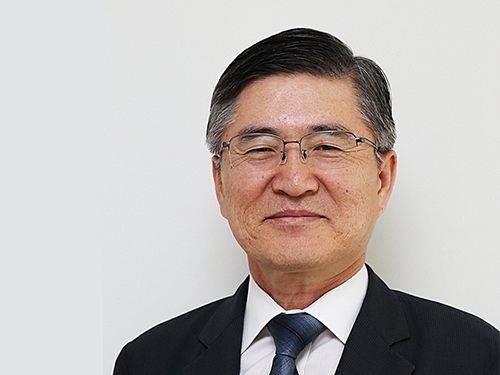 Professor Kwangjo Kim Named as Fellow of IACR
Professor Kwangjo Kim of the Graduate School of Information Security has been selected as a fellow of the International Association for Cryptologic Research (IACR).
The IACR has honored outstanding scholars who have achieved academic excellence in cryptologic research since 2004. He is the first Korean scholar to receive an IACR fellowship.
The IACR, established in 1981, is responsible for organizing international cryptologic conferences every year including the three major cryptologic academic conferences Eurocrypt, Crypto, and Asiacript. The IACR also sponsors workshop series such as the Theory of Cryptography Conference (TCC), the Workshop on Fast Software Encryption (FSE), the Public Key Cryptography Workshop (PKC), and Cryptographic Hardware and Embedded Systems (CHES).
Professor Kim, an internationally acclaimed scholar in the fields of cryptology and information security theory and its applications, was recognized for his outstanding academic achievements and leadership. He has made significant contributions to cryptology in Korea by hosting Asiacript in 1996 and 2001 as well as CHES in 2014. During his 34 years of academic activities, he has published more than 80 SCI journal papers and garnered more than 20,000 citations.
Professor Kim served on the board of the directors of the IACR from 2000 to 2004 and was the chairperson of the Asiacript Steering Committee from 2005 to 2008. He is on the editorial board of the online journal Cryptography.
Professor Kim said, “I am so humbled and honored to be named as a fellow of such a prestigious academic association. I will continue to strive to assist highly educated information security personnel with further research in cryptology.”
2017.03.16 View 8750
Professor Kwangjo Kim Named as Fellow of IACR
Professor Kwangjo Kim of the Graduate School of Information Security has been selected as a fellow of the International Association for Cryptologic Research (IACR).
The IACR has honored outstanding scholars who have achieved academic excellence in cryptologic research since 2004. He is the first Korean scholar to receive an IACR fellowship.
The IACR, established in 1981, is responsible for organizing international cryptologic conferences every year including the three major cryptologic academic conferences Eurocrypt, Crypto, and Asiacript. The IACR also sponsors workshop series such as the Theory of Cryptography Conference (TCC), the Workshop on Fast Software Encryption (FSE), the Public Key Cryptography Workshop (PKC), and Cryptographic Hardware and Embedded Systems (CHES).
Professor Kim, an internationally acclaimed scholar in the fields of cryptology and information security theory and its applications, was recognized for his outstanding academic achievements and leadership. He has made significant contributions to cryptology in Korea by hosting Asiacript in 1996 and 2001 as well as CHES in 2014. During his 34 years of academic activities, he has published more than 80 SCI journal papers and garnered more than 20,000 citations.
Professor Kim served on the board of the directors of the IACR from 2000 to 2004 and was the chairperson of the Asiacript Steering Committee from 2005 to 2008. He is on the editorial board of the online journal Cryptography.
Professor Kim said, “I am so humbled and honored to be named as a fellow of such a prestigious academic association. I will continue to strive to assist highly educated information security personnel with further research in cryptology.”
2017.03.16 View 8750 -
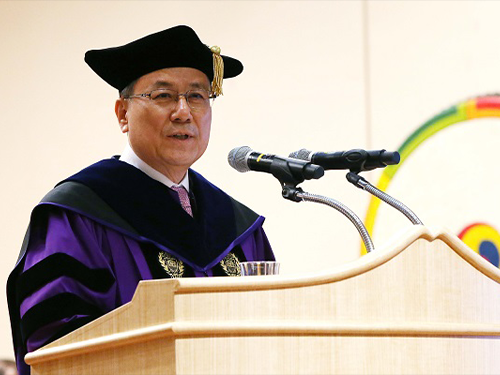 Dr.Sung-Chul Shin Inaugurated as the 16th President of KAIST
(President Shin delivers his inaugural address at the inauguration ceremony on March 15.)
Professor Sung-Chul Shin was officially inaugurated as its 16th president of KAIST on March 15 in a ceremony at the KAIST Auditorium.
The celebration began with a procession by dignitaries including the KAIST Board of Trustees Chairman Jang-Moo Lee, the National Academy of Sciences of Korea President Sook-Il Kwun, Daejeon City Mayor Sun-Taik Kwon, National Assemblyman Sangmin Lee, KAIST Alumni Association President Jungsik Koh. Academic leaders, foreign envoys, faculty, students, and staff members of KAIST joined the ceremony.
In his inaugural speech, President Shin presented a new vision for KAIST to become a global value creator in the Fourth Industrial Revolution. He said that KAIST has played a pivotal role in the nation’s industrialization and information revolution over the past half century and, with the advent of the new industry paradigm, KAIST should be now responsible for being a new value creator, not only serving the nation but pursuing global betterment. “KAIST should be a global hub of new knowledge and technology creation,” he emphasized.
Envisioning a “Global Value-Creative World-Leading University,” President Shin aims for KAIST to be an institution which can create global value as an innovative global leading research university. To realize this vision, he pledged to continue innovation in five areas of education, research & development, technology commercialization, globalization of the campus, and future strategy for the university and the nation.
In the educational innovation, he emphasized multidisciplinary studies, team work, and leadership training for students. To this end, KAIST will expand the non-departmental courses toward entire 4-year course while concurrently operating the existing system of declaring a major in students’ second year. KAIST will offer mandatory courses in humanities, social sciences, and arts and most classes will be run by team-based learning and group research activities. “KAIST Global Leadership Center” will support students to develop the qualities required for collaboration and the global leaderships.
With respect to the research innovation, President Shin said KAIST will establish “Convergence Research Matrix” system to foster strategic research groups for interdisciplinary and convergence collaboration across a wide range of divisions and departments. “Based on the CRMS, we will identify 10 flagship future-oriented convergence research areas for KAIST to truly claim its reputation as a world-leading research university,” he said. He added he will also introduce the “Collaborative Research Lab” system to better retain the academic successes without interruption, and to improve the continuity of research. “We will strive to organize teams of professors in diverse age groups to work together in mutually complementary fields,” he added.
In terms of technological commercialization, he hopes that KAIST to be a role model. He said he will make every effort to establish a resilient R&DB environment with ideas, technologies, and entrepreneurship. KAIST will rev up a new university-industry cooperation, fully sponsoring the creation of “Technology in-Kind Investment Companies.”
KAIST will continue to take initiative for globalization. He said KAIST will create an ‘English-Only Zone’ at the campus, saying that his ultimate goal is to create Korean-English bilingual campus. He also asked the foreign community to make their effort to learn Korean and Korean culture while staying at KAIST, in an effort to embrace diversity at the campus. He plans to increase the ratio of foreign faculty from nine percent to 15 percent, while doubling the current foreign student enrollment ratio of five percent.
As for the future strategy for the university and the nation, he will soon finalize the long-term strategic plan of “Vision 2031” that will lay out a roadmap for KAIST future direction toward its 60th anniversary. KAIST will also play a fundamental role in shaping national policies and strategies for science and technology by operating think-tank groups that consist of KAIST beyond disciplines. These think-tanks will design detailed development plans for KAIST as well as for national strategies for the advancement of science and technology.
He said that such institutional innovation will not be completed without the support, dedication, and passion of all KAIST members, adding that he will strive to serve them with 3Cs (Change, Communication, and Care).
For the full text of President Shin’s inaugural address, please click.
2017.03.15 View 11316
Dr.Sung-Chul Shin Inaugurated as the 16th President of KAIST
(President Shin delivers his inaugural address at the inauguration ceremony on March 15.)
Professor Sung-Chul Shin was officially inaugurated as its 16th president of KAIST on March 15 in a ceremony at the KAIST Auditorium.
The celebration began with a procession by dignitaries including the KAIST Board of Trustees Chairman Jang-Moo Lee, the National Academy of Sciences of Korea President Sook-Il Kwun, Daejeon City Mayor Sun-Taik Kwon, National Assemblyman Sangmin Lee, KAIST Alumni Association President Jungsik Koh. Academic leaders, foreign envoys, faculty, students, and staff members of KAIST joined the ceremony.
In his inaugural speech, President Shin presented a new vision for KAIST to become a global value creator in the Fourth Industrial Revolution. He said that KAIST has played a pivotal role in the nation’s industrialization and information revolution over the past half century and, with the advent of the new industry paradigm, KAIST should be now responsible for being a new value creator, not only serving the nation but pursuing global betterment. “KAIST should be a global hub of new knowledge and technology creation,” he emphasized.
Envisioning a “Global Value-Creative World-Leading University,” President Shin aims for KAIST to be an institution which can create global value as an innovative global leading research university. To realize this vision, he pledged to continue innovation in five areas of education, research & development, technology commercialization, globalization of the campus, and future strategy for the university and the nation.
In the educational innovation, he emphasized multidisciplinary studies, team work, and leadership training for students. To this end, KAIST will expand the non-departmental courses toward entire 4-year course while concurrently operating the existing system of declaring a major in students’ second year. KAIST will offer mandatory courses in humanities, social sciences, and arts and most classes will be run by team-based learning and group research activities. “KAIST Global Leadership Center” will support students to develop the qualities required for collaboration and the global leaderships.
With respect to the research innovation, President Shin said KAIST will establish “Convergence Research Matrix” system to foster strategic research groups for interdisciplinary and convergence collaboration across a wide range of divisions and departments. “Based on the CRMS, we will identify 10 flagship future-oriented convergence research areas for KAIST to truly claim its reputation as a world-leading research university,” he said. He added he will also introduce the “Collaborative Research Lab” system to better retain the academic successes without interruption, and to improve the continuity of research. “We will strive to organize teams of professors in diverse age groups to work together in mutually complementary fields,” he added.
In terms of technological commercialization, he hopes that KAIST to be a role model. He said he will make every effort to establish a resilient R&DB environment with ideas, technologies, and entrepreneurship. KAIST will rev up a new university-industry cooperation, fully sponsoring the creation of “Technology in-Kind Investment Companies.”
KAIST will continue to take initiative for globalization. He said KAIST will create an ‘English-Only Zone’ at the campus, saying that his ultimate goal is to create Korean-English bilingual campus. He also asked the foreign community to make their effort to learn Korean and Korean culture while staying at KAIST, in an effort to embrace diversity at the campus. He plans to increase the ratio of foreign faculty from nine percent to 15 percent, while doubling the current foreign student enrollment ratio of five percent.
As for the future strategy for the university and the nation, he will soon finalize the long-term strategic plan of “Vision 2031” that will lay out a roadmap for KAIST future direction toward its 60th anniversary. KAIST will also play a fundamental role in shaping national policies and strategies for science and technology by operating think-tank groups that consist of KAIST beyond disciplines. These think-tanks will design detailed development plans for KAIST as well as for national strategies for the advancement of science and technology.
He said that such institutional innovation will not be completed without the support, dedication, and passion of all KAIST members, adding that he will strive to serve them with 3Cs (Change, Communication, and Care).
For the full text of President Shin’s inaugural address, please click.
2017.03.15 View 11316 -
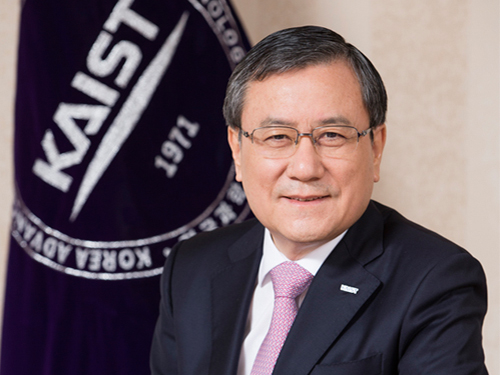 Dr. Sung-Chul Shin Selected 16th President of KAIST
(President Sung-Chul Shin)
The KAIST Board of Trustees elected Professor Sung-Chul Shin of the Department of Physics the 16th president of KAIST on February 21. Professor Shin succeeds President Sung-Mo Kang whose four-year term will end on February 23. He is the first KAIST alumnus to serve as its president.
The Board of Trustees announced, “We believe that Professor Shin’s scientific achievement, outstanding leadership, and clear vision will serve KAIST faculty, students, and staff very well. He will be the best person to help KAIST leap forward in the four years ahead.”
The newly-elected president said, “I am humbled and honored to have been elected to lead such a prestigious institute of Korea. Aiming to be one of the top ten global universities, KAIST will continue to innovate its systems.” Previously, Dr. Shin led the Daegu Gyeongbuk Institute of Science and Technology (DGIST) for six years as president since 2011.
Professor Shin joined the KAIST faculty in 1989. He graduated from Seoul National University and then earned his MS degree in condensed matter physics at KAIST in 1977. After earning his Ph.D. in material physics at Northwestern University in 1984, he worked at Eastman Kodak Research Labs as a senior research scientist for five years.
Before heading to DGIST, President Shin held key administrative positions at KAIST from the early 1990s including dean of planning, dean of the international office, and vice-dean of student affairs. During President Robert Laughlin’s tenure, the first foreign president at KAIST, he served as vice-president for two years from 2004. He also served on the Presidential Advisory Council on Science and Technology of the Korean government as vice chairperson from 2015 to 2016.
A renowned scholar in the field of nanoscience, President Shin’s research focuses on the artificial synthesis and characterization of nonmagnetic materials, magnetic anisotropy, and magneto-optical phenomena. He leads the Laboratory for Nanospinics of Spintronic Materials at KAIST and has published in 290 journals while holding 37 patents.
A fellow in the American Physical Society (APS) since 2008, he was the president of the Korean Physical Society from 2011 to 2012. He has been on the editorial board of J. Magnetism and Magnetic Materials from 2009 and was the first Korean recipient of the Asian Union of Magnetics Societies (AUMS) Award, which recognizes outstanding scientists in the field of magnetics.
President Shin envisions making KAIST’s research and education more competitive through continuing innovation. His innovation efforts will extend to the five key areas of education, research, technology commercialization, globalization, and future planning.
Among his priorities, he emphasizes multidisciplinary studies and leadership training for students. He plans to focus on undeclared major courses for undergraduates to help them expand their experience and exposure to diverse disciplines. This approach will help create well-rounded engineers, scientists, and entrepreneurs by enabling them to develop skills while leveraging a strong connection to the arts, humanities, and social sciences.
To better respond to Industry 4.0, which calls for convergence studies and collaborative work, he proposed establishing a ‘Convergence Innovation System’ by strategically selecting 10 flagship convergence research groups. In order to accelerate the technology commercialization and ecosystem of start-ups, he will strengthen entrepreneurship education, making it a prerequisite requirement for students. President Shin said he will spare no effort to incubate and spin-off ventures in which KAIST technology is being transferred. For globalization efforts, he plans to increase the ratio of foreign faculty from 9 percent to 15 percent, while doubling the current foreign student enrollment ratio of 5 percent. For future strategic innovation, he will implement a long-term innovation strategic plan dubbed ‘Vision 2031.’
2017.02.22 View 11807
Dr. Sung-Chul Shin Selected 16th President of KAIST
(President Sung-Chul Shin)
The KAIST Board of Trustees elected Professor Sung-Chul Shin of the Department of Physics the 16th president of KAIST on February 21. Professor Shin succeeds President Sung-Mo Kang whose four-year term will end on February 23. He is the first KAIST alumnus to serve as its president.
The Board of Trustees announced, “We believe that Professor Shin’s scientific achievement, outstanding leadership, and clear vision will serve KAIST faculty, students, and staff very well. He will be the best person to help KAIST leap forward in the four years ahead.”
The newly-elected president said, “I am humbled and honored to have been elected to lead such a prestigious institute of Korea. Aiming to be one of the top ten global universities, KAIST will continue to innovate its systems.” Previously, Dr. Shin led the Daegu Gyeongbuk Institute of Science and Technology (DGIST) for six years as president since 2011.
Professor Shin joined the KAIST faculty in 1989. He graduated from Seoul National University and then earned his MS degree in condensed matter physics at KAIST in 1977. After earning his Ph.D. in material physics at Northwestern University in 1984, he worked at Eastman Kodak Research Labs as a senior research scientist for five years.
Before heading to DGIST, President Shin held key administrative positions at KAIST from the early 1990s including dean of planning, dean of the international office, and vice-dean of student affairs. During President Robert Laughlin’s tenure, the first foreign president at KAIST, he served as vice-president for two years from 2004. He also served on the Presidential Advisory Council on Science and Technology of the Korean government as vice chairperson from 2015 to 2016.
A renowned scholar in the field of nanoscience, President Shin’s research focuses on the artificial synthesis and characterization of nonmagnetic materials, magnetic anisotropy, and magneto-optical phenomena. He leads the Laboratory for Nanospinics of Spintronic Materials at KAIST and has published in 290 journals while holding 37 patents.
A fellow in the American Physical Society (APS) since 2008, he was the president of the Korean Physical Society from 2011 to 2012. He has been on the editorial board of J. Magnetism and Magnetic Materials from 2009 and was the first Korean recipient of the Asian Union of Magnetics Societies (AUMS) Award, which recognizes outstanding scientists in the field of magnetics.
President Shin envisions making KAIST’s research and education more competitive through continuing innovation. His innovation efforts will extend to the five key areas of education, research, technology commercialization, globalization, and future planning.
Among his priorities, he emphasizes multidisciplinary studies and leadership training for students. He plans to focus on undeclared major courses for undergraduates to help them expand their experience and exposure to diverse disciplines. This approach will help create well-rounded engineers, scientists, and entrepreneurs by enabling them to develop skills while leveraging a strong connection to the arts, humanities, and social sciences.
To better respond to Industry 4.0, which calls for convergence studies and collaborative work, he proposed establishing a ‘Convergence Innovation System’ by strategically selecting 10 flagship convergence research groups. In order to accelerate the technology commercialization and ecosystem of start-ups, he will strengthen entrepreneurship education, making it a prerequisite requirement for students. President Shin said he will spare no effort to incubate and spin-off ventures in which KAIST technology is being transferred. For globalization efforts, he plans to increase the ratio of foreign faculty from 9 percent to 15 percent, while doubling the current foreign student enrollment ratio of 5 percent. For future strategic innovation, he will implement a long-term innovation strategic plan dubbed ‘Vision 2031.’
2017.02.22 View 11807 -
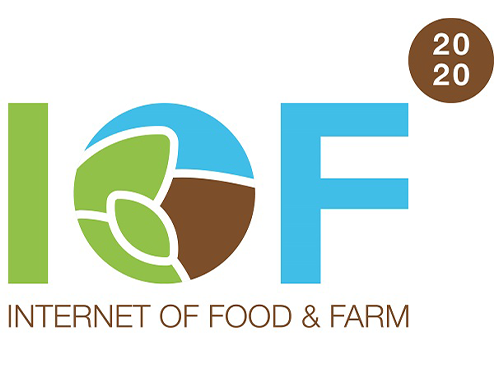 KAIST Joins IoF 2020 with 'Oliot'
KAIST will take part in the Internet of Food & Farm 2020 (IoF 2020) project with its international standard IoT open source platform ‘Oliot’ (Open Language for the Internet of Things, http://oliot.org), developed by a research team under Professor Daeyoung Kim from the School of Computing. Dr. Kim is also the director at the Auto-ID Labs at KAIST (http://autoidlabs.org).
IoF 2020 is a project to provide solutions and facilitate the large-scale uptake of IoT by addressing the organizational and technological challenges the European farming and food sectors face today. The project will develop innovative IoT solutions by fostering co-creation in interactive improvement cycles focusing on user acceptability and business models to boost technology and market-readiness levels.
Along with 71 partners from 16 countries, Professor Kim’s ‘Oliot’ will play a part in creating an ecosystem for providing safe and healthy agrifood, incorporating ICT(information and communications technologies) into the areas of smart farms and the agrifood service sector over the next four years. The project received €30 million in funding from Horizon 2020, the largest research and innovation program in the EU. KAIST is the only Korean institution to participate in this project.
For the project, Professor Kim’s team will initially establish smart farm and food service testbeds for the domestic agrifood industry with ‘Oliot’ prior to connecting to the European one. Professor Kim said he will leverage Artificial Intelligence (AI) and deep learning in order to analyze the data collected from the ecosystems in the EU. He aims to open an integrated IoT platform system incorporated with AI technologies to serve governments, institutions, corporations, and farmers.
It is expected that technologies developed for IoF 2020 will also benefit the domestic agrifood market and its supply chain infrastructure. Oliot will also be expected to further advance domestic smart industries including health care and connected vehicles.
George Beers, project manager at Wageningen University & Research and the IoF 2020 project coordinator said, “IoF 2020 has the potential to transform the paradigm of the supply chain of agrifood from the farm to consumers’ dining tables. We believe this project will contribute to enhance European competitiveness and excellence in the food commerce industry.”
Professor Kim said, “Technological applications of international standard IoT have already started in the domestic agrifood industry in collaboration with KAIST. We are working now with Asian and South American countries, as well as European nations, for the integration of a global agrifood business ecosystem.”
Auto-ID Labs are a global research consortium of seven academic institutions that research and develop new technologies for advancing global commerce, partnering with GS1 (Global Standard 1), a non-profit organization that established standards for global commerce such as introducing barcodes to the retail industry. The Auto-ID Labs include MIT, University of Cambridge, Keio University, Fudan University, and ETH Zurich/University of St. Gallen as well as KAIST.
2017.01.18 View 7831
KAIST Joins IoF 2020 with 'Oliot'
KAIST will take part in the Internet of Food & Farm 2020 (IoF 2020) project with its international standard IoT open source platform ‘Oliot’ (Open Language for the Internet of Things, http://oliot.org), developed by a research team under Professor Daeyoung Kim from the School of Computing. Dr. Kim is also the director at the Auto-ID Labs at KAIST (http://autoidlabs.org).
IoF 2020 is a project to provide solutions and facilitate the large-scale uptake of IoT by addressing the organizational and technological challenges the European farming and food sectors face today. The project will develop innovative IoT solutions by fostering co-creation in interactive improvement cycles focusing on user acceptability and business models to boost technology and market-readiness levels.
Along with 71 partners from 16 countries, Professor Kim’s ‘Oliot’ will play a part in creating an ecosystem for providing safe and healthy agrifood, incorporating ICT(information and communications technologies) into the areas of smart farms and the agrifood service sector over the next four years. The project received €30 million in funding from Horizon 2020, the largest research and innovation program in the EU. KAIST is the only Korean institution to participate in this project.
For the project, Professor Kim’s team will initially establish smart farm and food service testbeds for the domestic agrifood industry with ‘Oliot’ prior to connecting to the European one. Professor Kim said he will leverage Artificial Intelligence (AI) and deep learning in order to analyze the data collected from the ecosystems in the EU. He aims to open an integrated IoT platform system incorporated with AI technologies to serve governments, institutions, corporations, and farmers.
It is expected that technologies developed for IoF 2020 will also benefit the domestic agrifood market and its supply chain infrastructure. Oliot will also be expected to further advance domestic smart industries including health care and connected vehicles.
George Beers, project manager at Wageningen University & Research and the IoF 2020 project coordinator said, “IoF 2020 has the potential to transform the paradigm of the supply chain of agrifood from the farm to consumers’ dining tables. We believe this project will contribute to enhance European competitiveness and excellence in the food commerce industry.”
Professor Kim said, “Technological applications of international standard IoT have already started in the domestic agrifood industry in collaboration with KAIST. We are working now with Asian and South American countries, as well as European nations, for the integration of a global agrifood business ecosystem.”
Auto-ID Labs are a global research consortium of seven academic institutions that research and develop new technologies for advancing global commerce, partnering with GS1 (Global Standard 1), a non-profit organization that established standards for global commerce such as introducing barcodes to the retail industry. The Auto-ID Labs include MIT, University of Cambridge, Keio University, Fudan University, and ETH Zurich/University of St. Gallen as well as KAIST.
2017.01.18 View 7831 -
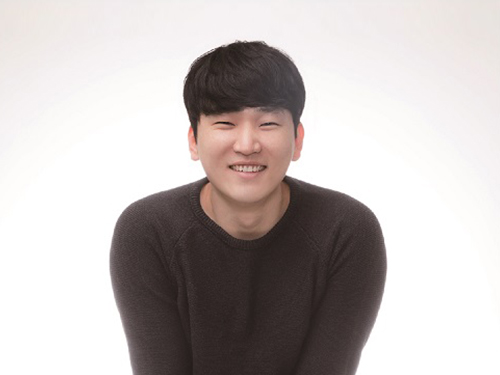 KAIST Ph.D. Candidate Wins the Next Generation of Engineers Award
Joo-Sung Kim, a doctoral student at the EEWS (Environment, Energy, Water and Sustainability) Graduate School won the inaugural Next Generation of Engineers Award in Leadership on December 14, 2016.
The National Academy of Engineering of Korea hosts this award to support creative and ambitious students who have the potential to become leaders in engineering and who will serve as role models for future Korean engineers. Based on the recommendations of university professors in engineering and members of the academy, seven students are selected for the award in the categories of leadership and entrepreneurship.
With his research focus on the development of high-performance, next-generation secondary cells for wearable devices such as smart watches, health bands, and smart eyewear, Joo-Sung created a startup, Lithium-ion Battery Energy Science and Technology (LiBEST), Inc. He plans to base his company at the Office of University and Industry Cooperation, KAIST, where he can receive assistance for launching the mass-production system for his technology.
His adviser, Professor Jang-Wook Choi of the EEWS Graduate School, noted, “Joo-Sung has been a great student who has a strong sense of curiosity and perseverance. The award is the by-product of his hard work.”
“I have always enjoyed my work and study as a researcher, but eventually would like to expand my career into business based on the results of my research. It would be wonderful if I could become a businessman like Elon Musk, Masayoshi Son, or Ma Yun and create a role model for aspiring engineers in Korea by combining science and technology with business demand to create social values that benefit many people,” Joo-Young said.
2016.12.26 View 10977
KAIST Ph.D. Candidate Wins the Next Generation of Engineers Award
Joo-Sung Kim, a doctoral student at the EEWS (Environment, Energy, Water and Sustainability) Graduate School won the inaugural Next Generation of Engineers Award in Leadership on December 14, 2016.
The National Academy of Engineering of Korea hosts this award to support creative and ambitious students who have the potential to become leaders in engineering and who will serve as role models for future Korean engineers. Based on the recommendations of university professors in engineering and members of the academy, seven students are selected for the award in the categories of leadership and entrepreneurship.
With his research focus on the development of high-performance, next-generation secondary cells for wearable devices such as smart watches, health bands, and smart eyewear, Joo-Sung created a startup, Lithium-ion Battery Energy Science and Technology (LiBEST), Inc. He plans to base his company at the Office of University and Industry Cooperation, KAIST, where he can receive assistance for launching the mass-production system for his technology.
His adviser, Professor Jang-Wook Choi of the EEWS Graduate School, noted, “Joo-Sung has been a great student who has a strong sense of curiosity and perseverance. The award is the by-product of his hard work.”
“I have always enjoyed my work and study as a researcher, but eventually would like to expand my career into business based on the results of my research. It would be wonderful if I could become a businessman like Elon Musk, Masayoshi Son, or Ma Yun and create a role model for aspiring engineers in Korea by combining science and technology with business demand to create social values that benefit many people,” Joo-Young said.
2016.12.26 View 10977